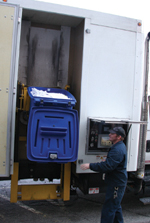MUSC among top in national recycling
competition
by Mary
Helen YarboroughPublic Relations
In its second year of competing nationally, MUSC has demonstrated how serious it takes recycling by ranking in the top tier among 400 colleges and universities that participate in the annual RecycleMania competition.
The categories of the increasingly stiff 10-week national competition among colleges and universities include overall recycling, per capita collection, cardboard or corrugated paper, paper and can collection, and food and organics recycling.
 Jason Metts, a
supply specialist in MUSC’s Engineering & Facilities, operates the
lift on a truck used to transfer tons of paper collected across campus
for recycling.
Jason Metts, a
supply specialist in MUSC’s Engineering & Facilities, operates the
lift on a truck used to transfer tons of paper collected across campus
for recycling.MUSC has placed as high as second in paper recycling, and it has placed within the top 1 percent of most other categories in which it is competing.
To encourage recycling, MUSC is now making it more convenient for everyone to recycle by introducing bins for co-mingled plastic, glass and cans.
MUSC can credit the office led by Christine vonKolnitz Cooley, which is dedicated to renewable and green efforts.
With the help of state grants used to add more equipment for recycling use, Cooley and MUSC are expanding the program and spreading the message that recycling is simply the right thing to do.
“We do have more recycling bins than ever before,” Cooley said. “We are changing the cans program so that it will be easier for people to recycle plastic, glass, and steel cans. I also think the fact that the paper is being handled confidentially encourages people to recycle.”
It may be difficult to put a price tag on what MUSC gains financially by recycling, Cooley explained.
“I do not think it’s the revenue that lures people to recycle. Revenue comes and goes,” she said. “Recycling does not cost as much as garbage collection, and we do get some money back for recycling.”
Avoiding waste and limiting the use of natural resources pays long-term dividends, such as saving forests, landfill space, and ensuring a healthier place to live and work.
As a community steward, MUSC’s efforts include a partnership with Hartsville-based Sonoco, an international corrugated paper manufacturer that buys the recycled paper from MUSC for commercial use.
“Sonoco has about seven or eight vendors they sell our paper to,” Cooley said. “They sell to paper recycling facilities in the Southeast first. If they have excess, they sell it to India. Shredded paper is made into toilet paper or paper towels. Cardboard is made into more cardboard or linerboard (similar to a file folder).”
MUSC is a member of the National Recycling Coalition, of which Cooley is a steering committee member of its College and University Recycling Council, as well as a member of Hospitals for a Healthy Environment, and the Association for the Advancement of Sustainability in Higher Education. MUSC also has committed to the Environmental Protection Agency's (EPA) WasteWise program, and recently signed the President’s Climate Commitment (visit
http://www.presidentsclimatecommitment.org/).
Competition continues
RecycleMania began in 1992, using the incentive of competition among colleges and universities, the traditionally large producers of recyclable waste. Supported by EPA’s WasteWise, the program is a coordinated project of National Recycling Coalitions College and University Recycling Council.
The next round of competition is a 10-week period that began Jan. 27 and runs to April 5, in which participating schools will vie for placement in categories that measure the success of their recycling and waste prevention efforts. This year's 400 competing schools, the most in the competition's history, represent 46 states and the District of Columbia, and include institutions ranging from small, two-year community colleges to Ivy League universities.
RecycleMania helps campus recycling coordinators rally students, faculty and staff participation in recycling and waste prevention programs, while offering bragging rights and special awards made of recycled materials. Though many schools have had recycling and waste prevention programs for years, studies have found that large volumes of recyclables still end up in the trash. RecycleMania motivates campus communities to recycle more often. By framing recycling into competitive terms, RecycleMania taps into the same intercollegiate spirit that drives sports rivalries.
Each week, the standings are posted online for all participants to see, motivating campuses to work harder as they aim not only for the top prizes, but also to beat out their own rival schools.
RecycleMania has tapped into Myspace and FaceBook as a way to encourage participants to boost participation (see http://www.myspace.com/recyclemania and http://www.facebook.com/profile.php?id=727341971).
For more information, call (202) 903-0851, or e-mail recyclemania@nrc-recycle.org.
Friday, March 18, 2008
Catalyst Online is published weekly,
updated
as needed and improved from time to time by the MUSC Office of Public
Relations
for the faculty, employees and students of the Medical University of
South
Carolina. Catalyst Online editor, Kim Draughn, can be reached at
792-4107
or by email, catalyst@musc.edu. Editorial copy can be submitted to
Catalyst
Online and to The Catalyst in print by fax, 792-6723, or by email to
catalyst@musc.edu. To place an ad in The Catalyst hardcopy, call Island
Publications at 849-1778, ext. 201.